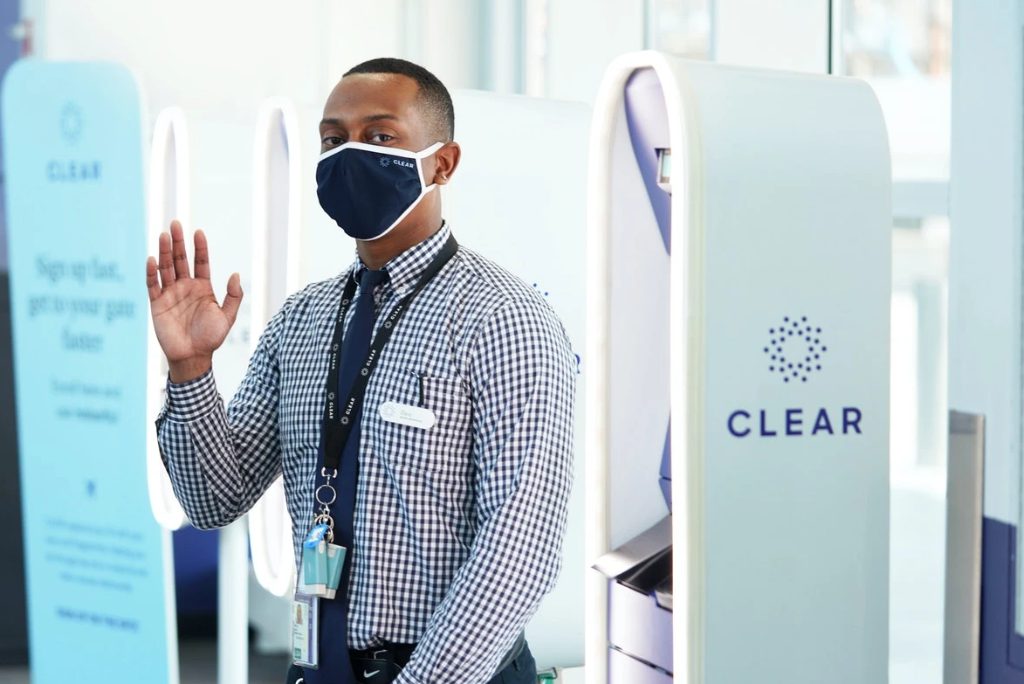Skift Take
The tech company Clear is hoping an IPO will help it fast-track a path to profitability. But for 11 years, it has been faster at speeding up security lanes than in getting to breakeven.
After 11 years, Clear Secure, the airport screening company, still isn’t profitable, but CEO Caryn Seidman-Becker has seemingly turned it into IPO material. When will the breakthrough come?
The biometric identity company filed for an initial public offering, eyeing listing its shares on the New York Stock Exchange under the symbol YOU.
Strategic equity holders include Delta Air Lines (with a 5 percent equity stake) and United Airlines. It has partnerships with those carriers. For example, Delta and United offer discounted or free pricing for Clear’s expedited screening offering at airports to members of their frequent flyer programs.
Clear is launching its public roadshow despite a year when pandemic restrictions kept most U.S. travelers stuck at home. The company said in financial filings released late Monday that its sales fell to $50.5 million in the three months ended March 31.
The filing to go public is a landmark moment for Clear CEO Seidman-Becker, who took over the company and relaunched it in 2010 after a failed first launch as Verified Identity Pass, founded by Steven Brill after the 9/11 terrorist attacks.
That said, Clear has never had a profit. It listed losses of $9 million in 2020, and $13.1 million in the three months ending March 31.
But the recovery in domestic travel holds promise for the company.
“We look forward to more opportunities to work alongside Clear to continue to innovate and deliver new services for our customers,” said United CEO Scott Kirby in a statement.
Clear has said its planned new features for airline partners include touchless lounge access and bag drop for members. Clear and Alaska Airlines have let flyers board on some flights by using their fingerprints for boarding passes. The tech vendor has been also signing partnerships with airlines to use fingerprints on electronic scanners as the way for travelers to access airport lounges without airline staff having to verify membership.
Subscription Model Proves Its Value
Clear showed resilience last year with a 78 percent member retention rate in 2020, compared to 86 percent in the pre-pandemic year of 2019. It turns out that a lot of people and companies are willing to pay $10 to $15 a month for a guaranteed cut to the front of some crowded airport security lines. That suggests a broader lesson about the potential for subscription models in the travel sector.
Clear said 5.6 million people have registered for its services, including free trials that don’t result in paid memberships and family accounts. What’s more, it has had 61 million “engagements” with customers, primarily verifications at the airport, since its founding in 2010. It operates under the brands Clear, Alclear, and Secure Identity.
While the company began 11 years ago by offering airport security in Orlando, Florida and and Denver, Colorado, Clear has since expanded to offering biometric identification in a variety of settings, such as at event venues like Madison Square Garden. It’s now at 38 airports (at 106 checkpoints) and 26 sports and entertainment venues.
The company estimated it would enjoy an approximately 16 times “lifetime value” relative to its average customer acquisition cost for Clear members who joined during 2019. But it wasn’t clear how it estimated that.
A Ground Game for Marketing
The company’s largest member acquisition channel is at airports, representing 60 to 70 percent of its member acquisitions in 2019 and 2020. That statistic shows the importance of prominent, in-person branding close to the long lines at airports and other venues in helping to drive sign-ups.
A physical footprint also spares the tech vendor from some of the digital marketing costs that have dragged down other consumer-facing brands.
The footprint can come with a hidden cost, namely, revenue sharing. Last year, 14 percent of Clear’s $230 million in revenue went to fees (both fixed and variable) with partners like airports, venues, and airlines. During pre-pandemic times, about 18 percent of its income went to sales and marketing.
Labor is another cost center. As of May 31, it had 1,646 full-time employees.
Facing Some Headwinds
While Clear has a significant lead in its sector, it faces competition from two other private entities — Telos Identity Management Solutions and Idemia Identity & Security USA — that also help enroll members on behalf of the U.S. Transportation Safety Administration’s PreCheck program.
A 2017 Airlines for America survey suggests that, during non-pandemic times, roughly 31 million people fly six times or more per year. This group of road warriors would appear to be prime target customers for Clear and its rivals.
Clear has been pushing a “health pass” to help travelers get moving again. The app helps to verify individuals’ Covid-19 status.
But it faces competition here, too, from organizations developing similar solutions, such as CommonPass, VaxYes, ConfirmD, PricewaterhouseCoopers, Salesforce, and IBM.
The company has also struggled to expand beyond the largest airports with the busiest terminals. Many frequent travelers sign up for TSA PreCheck, and those lines are often short. Some smaller airports also have balked at letting Clear operate in their terminals. They worry the number of potential customers is too small.
Inconsistency in service has also been a headwind for Clear. For example, at some airports, passengers verified by Clear go straight to screening. Yet elsewhere, TSA officers double-check boarding passes after Clear, eliminating some of the promised speed advantages relative to membership cost.
Earlier this year, security and travel services technology provider Pangiam bought the biometric facial recognition system VeriScan and it may also become a more direct competitor.
When Clear eventually expands outside of the U.S., it will face foreign rivals, such as European security company Veridos.
The Security Question
Data security is critical for a company like Clear. The company noted this in its financial filings.
Clear said that “security is paramount” and that “security is our core competency.” But the company also pointed out in the filings a blunt truth facing all companies: “We cannot guarantee absolute security.”
“Breaches and attacks on us or our third-party vendors or service providers may cause interruptions to the services we provide, degrade the member experience, cause members or partners to lose confidence and trust in our platform,” the filings said.
Members will have to trust the company can keep ahead of bad actors, especially as Clear branches into even more sensitive data, such as health information.
The most critical information it keeps is biometric data to enable its services. If a customer loses a password, they can get another one. But they can’t get another face or another fingerprint.
Yet the company has won the trust of respected people. For example, one of Clear’s board of directors is Jeffrey Boyd, the former CEO and chairman of the online travel agency conglomerate now called Booking Holdings.
Clear’s Larger Ambitions
It’s always been clear that the ambition of Clear CEO Caryn Seidman-Becker is to use the high-net-worth audience it grabs for faster security at airports to leverage them for use in many ways across a mix of non-travel purchases.
For example, the company wants to get into events, especially trade shows and conferences. Last year it signed a partnership with MGM Resorts to speed the return of meetings and conventions at MGM Resorts properties throughout the U.S. via its health pass. Future innovations could include touchless payments and permission to access select locations based on age validation or other factors.
The health pass could be an entryway to the health sector, too.
“We believe our secure identity platform has multiple use cases in thousands of hospitals and doctors’ offices nationwide including patient check-in, digital medical records, telehealth, and verified identity,” the financial filings said.
The startup is expanding a partnership with hospital networks like the one run by HSS (Hospital for Special Surgery).
Other strategic equity holders in Clear include Liberty Media (owner of Formula 1 and the Atlanta Braves) and Enlighted Hospitality (owner of Danny Meyer’s restaurants and other properties). Those investors hint at the company’s ambitions.
Subscribers to Skift sister brand Airline Weekly can read more on airport security.
Here’s the Clear S-1 filing:
The Daily Newsletter
Our daily coverage of the global travel industry. Written by editors and analysts from across Skift’s brands.
Have a confidential tip for Skift? Get in touch
Tags: airport security, clear, digital health passports, event security, health passports, ipo, loyalty, subscriptions, tsa
Photo credit: A Clear checkpoint. The company filed to go public. Clear

